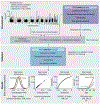Improving reporting standards for polygenic scores in risk prediction studies
- PMID: 33692554
- PMCID: PMC8609771
- DOI: 10.1038/s41586-021-03243-6
Improving reporting standards for polygenic scores in risk prediction studies
Abstract
Polygenic risk scores (PRSs), which often aggregate results from genome-wide association studies, can bridge the gap between initial discovery efforts and clinical applications for the estimation of disease risk using genetics. However, there is notable heterogeneity in the application and reporting of these risk scores, which hinders the translation of PRSs into clinical care. Here, in a collaboration between the Clinical Genome Resource (ClinGen) Complex Disease Working Group and the Polygenic Score (PGS) Catalog, we present the Polygenic Risk Score Reporting Standards (PRS-RS), in which we update the Genetic Risk Prediction Studies (GRIPS) Statement to reflect the present state of the field. Drawing on the input of experts in epidemiology, statistics, disease-specific applications, implementation and policy, this comprehensive reporting framework defines the minimal information that is needed to interpret and evaluate PRSs, especially with respect to downstream clinical applications. Items span detailed descriptions of study populations, statistical methods for the development and validation of PRSs and considerations for the potential limitations of these scores. In addition, we emphasize the need for data availability and transparency, and we encourage researchers to deposit and share PRSs through the PGS Catalog to facilitate reproducibility and comparative benchmarking. By providing these criteria in a structured format that builds on existing standards and ontologies, the use of this framework in publishing PRSs will facilitate translation into clinical care and progress towards defining best practice.
Figures

References
Publication types
MeSH terms
Grants and funding
- 098381/WT_/Wellcome Trust/United Kingdom
- U24 HD093486/HD/NICHD NIH HHS/United States
- 203141/WT_/Wellcome Trust/United Kingdom
- U41 HG006834/HG/NHGRI NIH HHS/United States
- U24 HD093487/HD/NICHD NIH HHS/United States
- RG/18/13/33946/BHF_/British Heart Foundation/United Kingdom
- U01 DK105535/DK/NIDDK NIH HHS/United States
- U24 HD093483/HD/NICHD NIH HHS/United States
- U41 HG007823/HG/NHGRI NIH HHS/United States
- 212259/WT_/Wellcome Trust/United Kingdom
- RG/13/13/30194/BHF_/British Heart Foundation/United Kingdom
- K08 HG010155/HG/NHGRI NIH HHS/United States
- MR/L003120/1/MRC_/Medical Research Council/United Kingdom
- 106130/WT_/Wellcome Trust/United Kingdom
- U41 HG009649/HG/NHGRI NIH HHS/United States
- 090532/WT_/Wellcome Trust/United Kingdom
- U24 HG009650/HG/NHGRI NIH HHS/United States
- WT_/Wellcome Trust/United Kingdom
- U41 HG009650/HG/NHGRI NIH HHS/United States
LinkOut - more resources
Full Text Sources
Other Literature Sources
Medical
Miscellaneous

